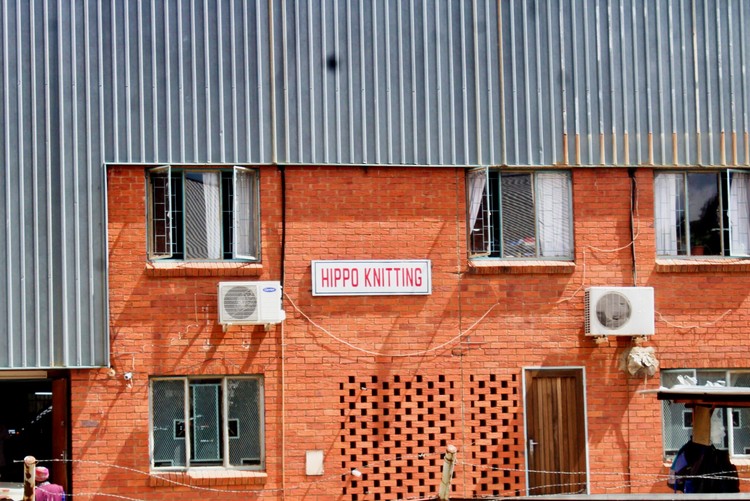Lesotho sheds textile jobs amidst US trade uncertainty
Hippo Knitting has laid off 295 workers and plans to retrench another 420 in January
Hippo Knitting, once one of Lesotho’s largest textile employers, may close down next year. Photo: Sechaba Mokhethi
- Lesotho textile factory Hippo Knitting laid off 295 workers last month, plans to retrench another 420 workers in January, and may shut down altogether by July 2026.
- The company says this is due to cancelled US orders caused by uncertainty over the renewal of the AGOA trade agreement with the US.
- But the National Clothing, Textile and Allied Workers Union accuses the company of using AGOA uncertainty as a cover and questions the company’s attempts to find new buyers and acquire favourable compliance certification for US brands.
Hippo Knitting, once one of Lesotho’s largest textile employers, is facing collapse. The factory in Maseru, which employed over 800 workers, laid off 295 last month and announced plans to retrench another 420 employees in January.
The company blames uncertainty over the renewal of the African Growth and Opportunity Act (AGOA), a US trade deal granting duty-free access for African textile exports.
Company director Grace Lin says many international buyers have “paused or cancelled orders” because renewal of AGOA “remains unconfirmed”.
In a letter last week to the Department of Labour, the Ministry of Trade, and to trade unions, Lin said “production levels are now too low to sustain operations”.
“The absence of AGOA renewal has made our products uncompetitive in the US market,” she wrote. “With profound sadness, we must retrench a further 420 employees, effective 25 January 2026.”
The letter also warns that if conditions do not improve, Hippo Knitting may close completely by July 2026.
Despite cost-cutting measures and attempts to secure new buyers since June, the company says, it “has been unable to generate sufficient volume to remain operational”.
It has appealed to the government for emergency relief, including a freeze on factory rentals and financial support “to sustain remaining operations”.
Lin said the company would comply with all labour laws during the retrenchment process, but keeping jobs depended “on swift and collective action”.
Unions protest
National Clothing, Textile and Allied Workers Union secretary general Sam Mokhele told GroundUp that the announcement came as a shock to unions. He accused Hippo Knitting of using AGOA uncertainty as cover for targeting trade union members.
“This letter came barely two weeks after they retrenched 295 workers,” said Mokhele. “We were still working on challenging those retrenchments, because they were unlawful and selective [targeting union members], when they announced another 420 job cuts.”
“We advised the company to avoid retrenchment by giving workers temporary off days while they look for new orders,” said Mokhele. “They refused.”
“We proposed government intervention during the last retrenchment, but they refused,” he said. “Now they are the ones crying for help.”
Unions protested on 31 October, calling for urgent government action to protect textile jobs and press for AGOA renewal.
“If retrenchment goes ahead, we will make sure severance benefits are correctly calculated and paid,” said Mokhele.
Unions, including United Textile Employees, Textile and Allied Workers Union, Independent Democratic Union of Lesotho, and Lesotho Workers Association, plan to meet with the ministers for trade and labour this week.
The unions also question whether the company has been actively seeking new markets since June.
Mokhele speculated that Hippo Knitting may be losing buyers because it has failed to obtain compliance certification under the Worldwide Responsible Accredited Production (WRAP) system – a set of international labour and ethical standards required by many US brands.
“When we ask about their WRAP certificate, they can’t explain why they don’t have it,” Mokhele said.
Mokhele said the company once asked the unions to write a letter confirming that past harassment complaints had been resolved so that it could obtain the certificate. “We did that in good faith, hoping it would help them fix their problems. But when they failed to obtain the certificate, they never explained why.”
Hippo Knitting, union leaders warn, could be the first in a wave of factory closures if the AGOA trade agreement is not renewed soon.
Despite repeated attempts to get comment, Hippo Knitting has not responded.
Support independent journalism
Donate using Payfast

Don't miss out on the latest news
We respect your privacy, and promise we won't spam you.
Next: Workers shut down Cape Town construction project over unpaid wages
Previous: Transgender prisoner wins right to hormone therapy
© 2025 GroundUp. This article is licensed under a Creative Commons Attribution-NoDerivatives 4.0 International License.
You may republish this article, so long as you credit the authors and GroundUp, and do not change the text. Please include a link back to the original article.
We put an invisible pixel in the article so that we can count traffic to republishers. All analytics tools are solely on our servers. We do not give our logs to any third party. Logs are deleted after two weeks. We do not use any IP address identifying information except to count regional traffic. We are solely interested in counting hits, not tracking users. If you republish, please do not delete the invisible pixel.

